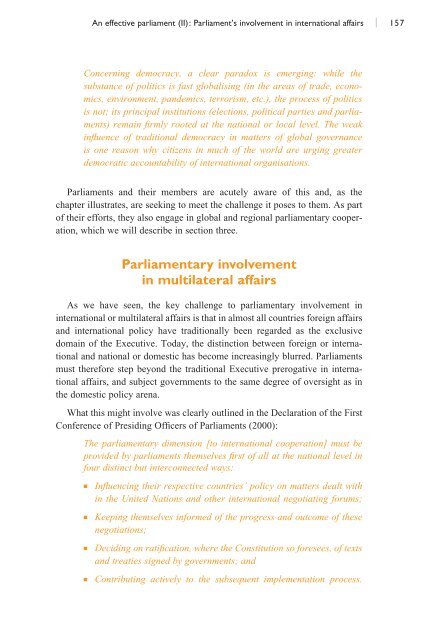PARLIAMENT AND DEMOCRACY - Inter-Parliamentary Union
PARLIAMENT AND DEMOCRACY - Inter-Parliamentary Union
PARLIAMENT AND DEMOCRACY - Inter-Parliamentary Union
Create successful ePaper yourself
Turn your PDF publications into a flip-book with our unique Google optimized e-Paper software.
An effective parliament (II): Parliament’s involvement in international affairs I 157<br />
Concerning democracy, a clear paradox is emerging: while the<br />
substance of politics is fast globalising (in the areas of trade, economics,<br />
environment, pandemics, terrorism, etc.), the process of politics<br />
is not; its principal institutions (elections, political parties and parliaments)<br />
remain firmly rooted at the national or local level. The weak<br />
influence of traditional democracy in matters of global governance<br />
is one reason why citizens in much of the world are urging greater<br />
democratic accountability of international organisations.<br />
Parliaments and their members are acutely aware of this and, as the<br />
chapter illustrates, are seeking to meet the challenge it poses to them. As part<br />
of their efforts, they also engage in global and regional parliamentary cooperation,<br />
which we will describe in section three.<br />
<strong>Parliamentary</strong> involvement<br />
in multilateral affairs<br />
As we have seen, the key challenge to parliamentary involvement in<br />
international or multilateral affairs is that in almost all countries foreign affairs<br />
and international policy have traditionally been regarded as the exclusive<br />
domain of the Executive. Today, the distinction between foreign or international<br />
and national or domestic has become increasingly blurred. Parliaments<br />
must therefore step beyond the traditional Executive prerogative in international<br />
affairs, and subject governments to the same degree of oversight as in<br />
the domestic policy arena.<br />
What this might involve was clearly outlined in the Declaration of the First<br />
Conference of Presiding Officers of Parliaments (2000):<br />
The parliamentary dimension [to international cooperation] must be<br />
provided by parliaments themselves first of all at the national level in<br />
four distinct but interconnected ways:<br />
■ Influencing their respective countries’ policy on matters dealt with<br />
in the United Nations and other international negotiating forums;<br />
■ Keeping themselves informed of the progress and outcome of these<br />
negotiations;<br />
■ Deciding on ratification, where the Constitution so foresees, of texts<br />
and treaties signed by governments; and<br />
■ Contributing actively to the subsequent implementation process.

















